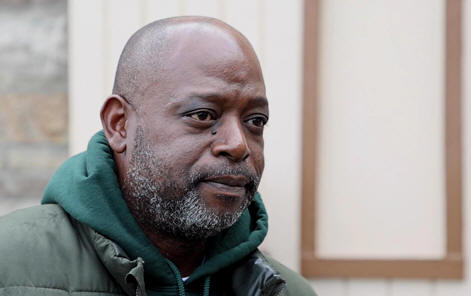|
|
|
|
|
|
 |
|
|
"We are
passionate
about
ensuring
that
every
Detroiter,
regardless
of their
backgrounds,
gets a
second
chance
to enter
the
workforce,
contribute
to the
City's
economic
viability,
and
sustain
themselves
and
their
families,"
said
Lionel
Bradford,
President
of the
Greening
of
Detroit.
(Photo
by HB
Meeks/Tell
Us USA
News
Network) |
| |
DTEP
tree
planting
being
used to
cool the
city's
corridors
and
screen
blight,
provides
valuable
job
skills
to
Detroiters
•
Cooling
Detroit's
commercial
corridors
is one
key goal
in the
massive
tree-planting
initiative
• As
crews
work to
reforest
Detroit,
trees
are also
being
used to
fight
blight
•
Job
training
is
available
for 300
Detroiters
through
the
Detroit
Tree
Equity
Partnership
DETROIT-
Today,
city
officials,
residents,
and
partnering
organizations
joined
to
highlight
the
City's
evolving
planting
initiative
of
bringing
75,000
trees to
the
streets
of
Detroit.
This
initiative
is part
of the
City's
continuing
proactive
management
of our
tree
canopy,
which
began in
2016.
Through
the
Detroit
Tree
Equity
Partnership,
the City
of
Detroit
is
working
to cool
the
corridors
with
trees
and work
to
shield
residents
from
blight
by
planting
trees in
front of
businesses
such as
scrapyards.
Since
launching
in 2022,
8,000
trees
have
been
planted,
and
thousands
more are
expected
to be
planted
in Fall
2023,
focusing
on the
corridors
of East
Warren
Avenue,
West
McNichols
Road,
and Joy
Road and
several
neighborhoods
with low
canopy
coverage
and
elevated
heat
island.
DTEP
planting
crews
finishing
up tree
planting
along
West
McNichols
Road.
"Commercial
corridors
are a
cornerstone
of our
communities,"
said
Whitney
Smith,
Reforestation
Manager,
City of
Detroit.
"On W.
McNichols,
you can
find
everything
from
grocery
stores,
churches,
restaurants,
shopping
boutiques,
and
nightlife.
Trees
improve
the
vibrancy
of our
corridors
by
increasing
their
walkability
and
beauty.
They
also
improve
environmental
conditions.
Our
corridors
have the
highest
traffic
volumes
outside
freeways,
which
means
higher
pollution
and
carbon
emissions.
Trees
along
our
corridors
do
nature's
work of
filtering
pollutants
carbon
and
provide
microclimate
cooling
effects."
Reflecting
on one
year of
planting,
the DTEP
is
celebrating
a
successful
inaugural
year and
the
recent $
3
million
Community
and
Urban
Forestry
IRA
award,
which
will
allow
for
continued
growth
and
stewardship
of this
initiative.
"American
Forests
could
not be
happier
with the
Detroit
Tree
Equity
Partnership's
progress
during
the
first
year,"
said
Jenni
Shockling,
Senior
Manager,
American
Forests.
"DTEP
has
ambitious
goals to
plant
and
maintain
75,000
trees
and
train
and
place
300
residents
in five
years
and, by
working
collaboratively,
is on
pace to
meet or
exceed
those
goals.
We are
excited
to be
planting
in
strategic
corridors
and
high-visibility
locations
throughout
the City
and are
excited
about
improving
Tree
Equity
outcomes
throughout
the
entire
City."
Planting
crews
devotedly
work to
plant
and
maintain
75,000
trees
throughout
Detroit.
Additional
trees in
the City
will
have a
positive
ripple
effect
as
officials
stress
that
planting
trees is
necessary
to
maintain
and
increase
canopy
cover,
optimize
the
benefits
trees
offer,
and
replace
trees
that
have
been
removed
or lost
to
natural
mortality.
Mature
trees
remove
48
pounds
of
carbon
from the
air per
year, so
in
addition
to
cooling
urban
areas,
each
tree
planted
means
cleaner
air and
lower
asthma
rates
for
Detroiters.
With an
increased
focus on
planting
and
establishing
new
trees to
advance
the
City's
sustainability
and
climate
work,
Detroit
is on
track to
meet and
significantly
exceed
its tree
planting
goals
outlined
in the
Sustainability
Action
Agenda –
1,000
trees
annually,
in zip
codes
with
less
than 20%
canopy
coverage.
"Tree
equity
goes
beyond
simply
planting
trees;
it's an
opportunity
to
reduce
heat
islands,
provide
shade
for kids
to play
under in
the
summer,
and
create
jobs for
people
in the
Community,"
explained
Jack
Akinlosotu,
Director,
Detroit
of
Sustainability,
City of
Detroit.
Through
the
partnership
with
DTEP,
along
with The
Greening
of
Detroit
and DTE
Energy,
funds
are
available
to hire
and
train
Detroiters
to
handle
the
planting
and
maintenance
of the
trees
with a
certified
pre-apprenticeship
tree
care
program
as an
initiative
committed
to
developing
a tree
care
workforce.
DTEP
planting
crews
walk
neighbors
and
community
partners
through
the
planting
process.
"We are
passionate
about
ensuring
that
every
Detroiter,
regardless
of their
backgrounds,
gets a
second
chance
to enter
the
workforce,
contribute
to the
City's
economic
viability,
and
sustain
themselves
and
their
families,"
said
Lionel
Bradford,
President
of the
Greening
of
Detroit.
Greening
of
Detroit,
the lead
workforce
development
partner,
developed
its
Detroit
Conservation
Corps
(DCC)
workforce
development
program
in 2015
to
provide
disenfranchised
Detroiters
with an
apprentice-based
landscape
training
integrated
with
comprehensive
support
services
to
prepare
participants
for
full-time
employment
in
"green-collared"
jobs.
All DTEP
crew
members
are
trained
in the
DCC,
which
prioritizes
providing
quality,
case-management,
and
assistive
services
to
support
individuals
who have
faced
previous
challenges
to
maintaining
full-time
employment,
including
those
with a
history
of
incarceration.
Once the
tree
planting
initiative
is
complete,
these
residents
can
convert
the
skills
they
learned
into
good-paying
jobs in
the tree
care
industry.
DTEP
will
build on
this
effort
to
develop
career
opportunities
for
Detroit
residents
in the
tree
care
industry.
The DTEP
workforce
will
focus on
tree
maintenance,
planting,
and
establishment.
Care
like
proactive
pruning
cycles
improve
the
overall
health
of the
tree
population
and may
eventually
reduce
maintenance
costs.
In most
cases,
pruning
cycles
will
correct
tree
defects
before
they
worsen,
which
could
avoid
problems
before
they
become
severe
and
costly.
Advertise With Us:

Certified Minority Business Enterprise

|
|
|
|
|
|
|
|
|